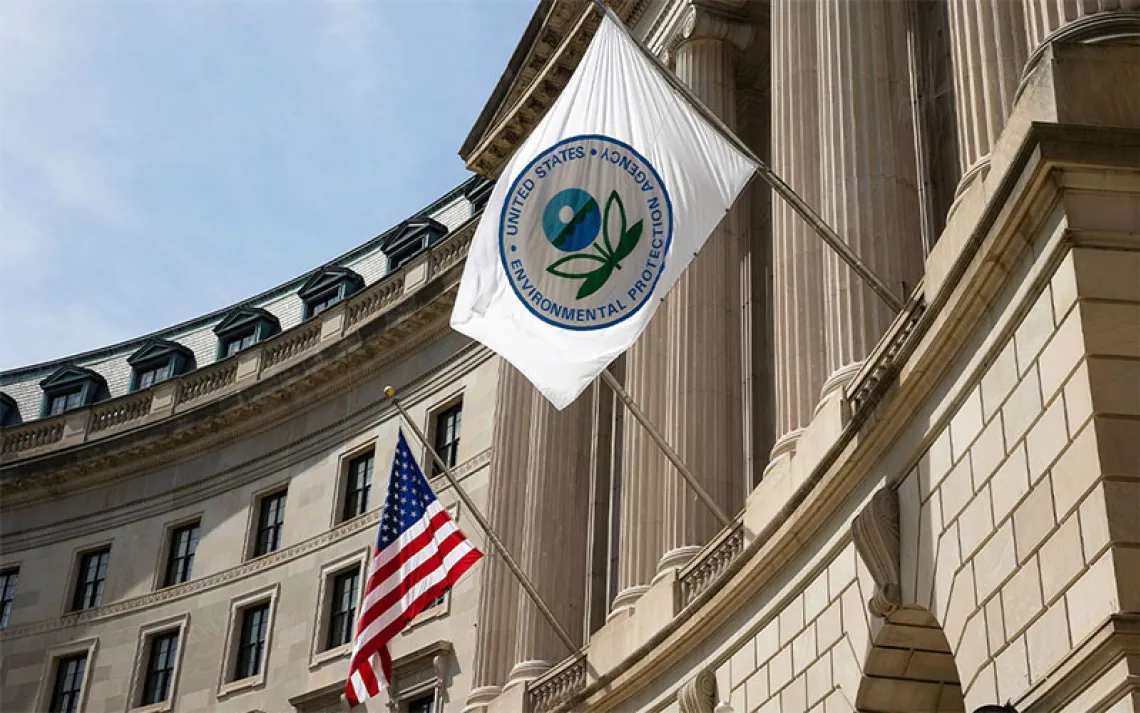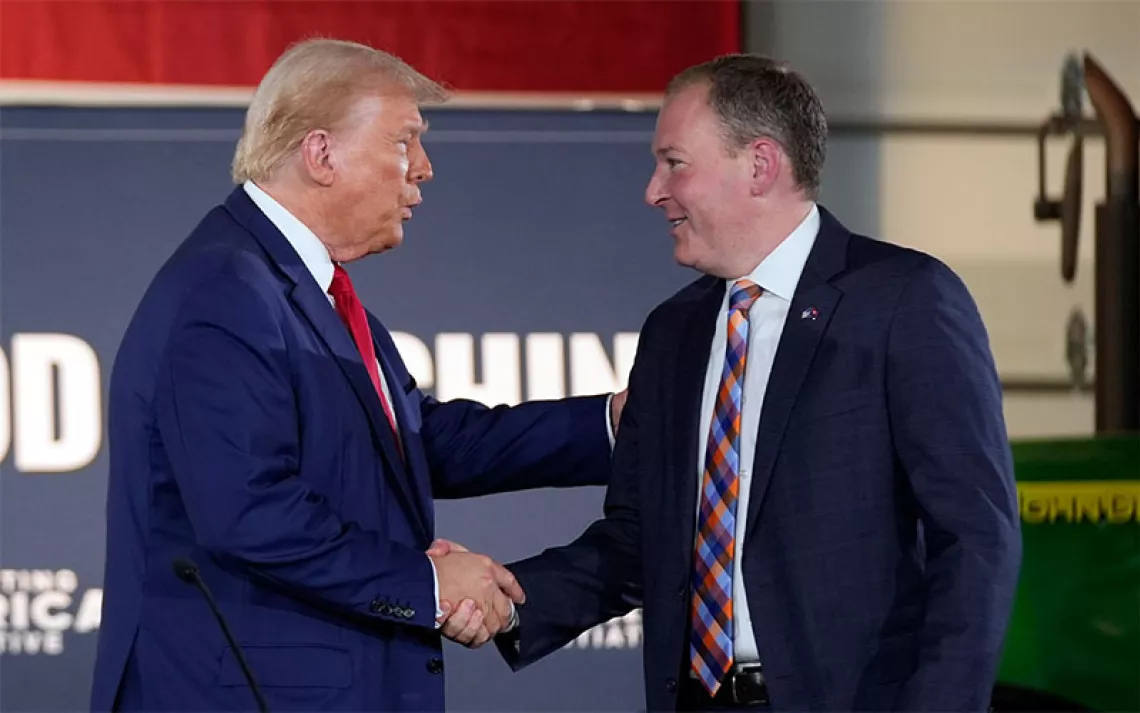Why Is the EPA Really Repealing Methane Emissions Regulations?
The Trump administration pushed for regulations repeal

Photo by Leonid Ikan/iStock
As soon as President Trump took office in 2016, the Environmental Protection Agency began dismantling Obama-era regulations on methane emissions and other pollutants from the oil and gas industry. The rollbacks—though they face challenges in court from environmental groups and dozens of cities and states—were finalized in August.
The Trump administration has eliminated countless regulations aimed at capping greenhouse gas emissions and protecting communities from air and water pollution. The justification for these removals is that they are “burdensome red tape” for American industry, unnecessarily costing businesses and the economy.
What’s curious about the methane rule rollback is that Big Oil isn’t on board. Shell, ExxonMobil, and BP all oppose the measures.
“Needless to say, having Exxon support your rules does not mean they are not going to be rolled back under a Trump administration,” said Lauren Pagel, policy director at the environmental nonprofit Earthworks. “There are smaller companies who just want to produce oil and gas at the cheapest rate possible, with the least oversight possible. I think this is for them.”
Such smaller companies, however, haven’t awoken to the fact that these rollbacks may hurt, rather than help, the industry.
The Obama administration’s regulations required operators to monitor, detect, and repair gas leaks at wells and along production lines for both new and existing sources. Natural gas is mostly methane after all, and methane is an exceptionally strong greenhouse gas (GHG). Though it only lasts 12 years in the atmosphere—generally, a shorter time span than other GHGs like carbon dioxide and nitrous oxide—methane is 80 times more effective at trapping heat than CO2. Because of its potency and life span, regulating it is a highly appealing way to quickly pump the brakes on climate change, buying us time to chip away at larger carbon dioxide reductions.
In 2018, methane emissions accounted for 10 percent of total GHG emissions in the US, with natural gas and petroleum systems contributing 28 percent of total methane emissions, according to the EPA. While that might not seem like a lot, the potency of methane, how quickly methane emissions are rising (in 2019, emissions rose to levels not seen in three decades), and the fact that there’s reason to believe the EPA significantly underreports emissions are all alarming.
To make matters worse, says Sarah Smith of the Clean Air Task Force, “Methane is released alongside volatile organic compounds for smog and hazardous air pollutants like benzene and formaldehyde.” The previous Obama regulations targeted these associated pollutants and toxins, which are harmful to human health.
“The pollution doesn’t just stay put. We see asthma attacks attributed to this industry all across the country. We see increased cancer risk in communities near the drilling operations,” Smith said. These health impacts from the oil and gas industry are especially present in Black and Latino communities.
The science is clear, and somehow even Big Oil agrees. Gretchen Watkins, the president of Shell in the US, wrote in a statement that “the negative impacts of leaks and fugitive emissions have been widely acknowledged for years, so it's frustrating and disappointing to see the administration go in a different direction.”
How is it that in this instance, Shell and other large fossil fuel companies seem to be on the same page as environmentalists? The answer has largely to do with public image.
Dan Zimmerle, the director of Colorado State University’s Methane Emissions Technology Evaluation Center (METEC), works on leak-detection testing and innovation, a field into which millions of dollars have been invested in next-generation technologies, from airplanes to cameras to drones.
He interacts with a wide swath of the industry, including big corporations that, he says, “need to deal with the reputation of their company internationally, independent of whatever the mood is in Texas.”
These companies invest in leak detection and repair, he believes, because they want to burnish their public image.
“They are suffering from a bad reputation,” Zimmerle said, not from the financial cost of regulations.
Massive energy corporations like Shell, BP, and ExxonMobil have the internal resources, be it funds or expertise, to comply with methane regulations. More importantly, they have poured endless money into promoting natural gas as a “cleaner” energy than fuels such as coal. Deregulation threatens that reputation not just in US markets but around the globe, as these corporations operate within foreign governments that may be trending toward more stringent climate policies than the US and who are not eager to import “dirty” US energy. As a result, many individual corporations have committed to limit methane emissions on their own, regardless of federal directives.
According to Sierra Club attorney Andres Restrepo, methane regulations are in many ways a win-win for the environment, human health, and the energy industry.
“There are cost-effective ways of reducing these emissions very significantly. You can get a lot of emissions reductions done with very easy methods, with techniques that are readily available, that many companies have been using for years,” Restrepo said. “It does not break the bank for these companies at all. In some cases, it can even save them money.”
Those savings could come in part because companies are increasing their efficiency by limiting losses of the gas they are trying to sell. Monitoring and repairing leaks has also spurred innovation and jobs in the sector, such as the work that is being done by Zimmerle and his team at METEC. Someone, after all, has to develop the technology to find leaks, and someone else has to detect and correct them in the field.
So if the regulations are positive for the planet, people, and industry, why is the Trump administration really repealing them?
The first reason has to do with ideology. “This administration and this EPA are, as purely an ideological matter, hostile to the idea of environmental protection,” Restrepo said.
Embedded in this hostility is an ethic that vaunts deregulation for its own sake, as evident when Trump passed an executive order in 2017 stipulating that for every regulation passed, two must be repealed.
Lauren Pagel agrees. “I think that they just want to barrel through with this deregulation, regardless. I don’t know if they even want to stop and think about it,” she said.
The second reason for the rollbacks concerns small and medium-size fossil fuel firms. According to EPA administrator Wheeler, “regulatory burdens put into place by the Obama-Biden administration fell heavily” on these companies, who purportedly lack the deep pockets for compliance of industry behemoths. While Big Oil has bemoaned the rollbacks, these smaller companies in the US have celebrated them.
The EPA estimates that the removal of methane regulations will save the industry between $17 million and $19 million per year. That may seem like a relatively small sum for a sector that pulls in billions in revenue, but beyond this regulatory drama looms a bigger problem—the dire financial straits of the oil and gas industry.
“I think most people assume because they are producing so much, they must be making a lot of money. But they are just burning through cash,” said Clark Williams-Derry, energy finance analyst at the Institute for Energy Economics and Financial Analysis. When describing the financial status of the industry, he said, “the simplest word that comes to mind is bloodbath.”
The problem is simply too much supply. In 2008, OPEC was restricting its oil reserves so tightly that scarcity pushed the price of a barrel to its peak of $160. The demand for cheaper alternatives, like gas, and oil produced in the US, skyrocketed. Then in 2014, fearing loss of market share, OPEC opened the tap. Now there’s too much of both gas and oil. Prices and profits plummeted for big and small companies, even before the blow of the pandemic (and the blow was bad). Emblematic of how the mighty have fallen, ExxonMobil was kicked out of the Dow Jones Industrial Average in August.
Amid this windfall, methane regulations would actually push companies to scale back their production as a natural byproduct of compliance, according to Williams-Derry. This, ironically, would benefit their bottom lines by decreasing the energy glut. But there’s no such restraint here—“They’re drill-a-holics,” he said. Instead, these smaller producers will continue to bleed money while also bleeding methane into the environment. What was once a win-win just became a lose-lose.
If Trump loses the election in November, the political landscape of this issue could shift dramatically. Biden has taken flack from progressives for not explicitly saying he would ban fracking, yet it would be a stretch to describe him as a fracking-friendly candidate. The Biden-Harris platform is committed to instating “aggressive methane pollution limits for new and existing oil and gas operations.” Biden also opposes oil and gas leasing on public lands. It is difficult to predict, however, how long reversing the Trump administration’s actions and reinstating regulations could take. It took Trump almost his entire presidency to undo Obama’s 2016 regulations.
“What would make this really easy to unravel is not just Biden winning but Democrats taking control of the Senate too,” said Tim Puko of the Wall Street Journal on the podcast, "Trump on Earth." Any recently adopted regulations under the Trump administration could be erased by Congress in a new administration under the Congressional Review Act, as happened with some Obama-era rules when the Republican congress assumed power in 2016. Methane regulations appear to be first on the docket for Democrats in such a political future.
It’s possible that a Biden administration would not simply redo historic regulations but go beyond Obama on climate policy.
“We’re hoping this next administration will declare a climate emergency and use every law that’s currently at their disposal to make sure we are meeting our Paris climate commitments and more,” said Pagel. She’d like to see the government establish the most stringent regulations possible for methane under the Clean Air Act as well as devise a plan for a managed decline of the fossil fuel industry. As the industry continues to wither financially and we move toward a cleaner energy economy, Pagel would like to avoid the environmental and economic catastrophe of “chaotic decline,” where well pads are abandoned and unemployment skyrockets in the sector.
In the meantime, the bald facts of these methane emissions rollbacks remain.
“Regulators are trying to bail out an industry that is structurally unsound. They are trying to bail out a boat that has a giant hole in the hull,” Williams-Derry said. “No matter how much they give in, it’s not going to fix the industry until they address the fundamental problem that it is no longer profitable to produce prodigious quantities of oil and gas.”
 The Magazine of The Sierra Club
The Magazine of The Sierra Club



